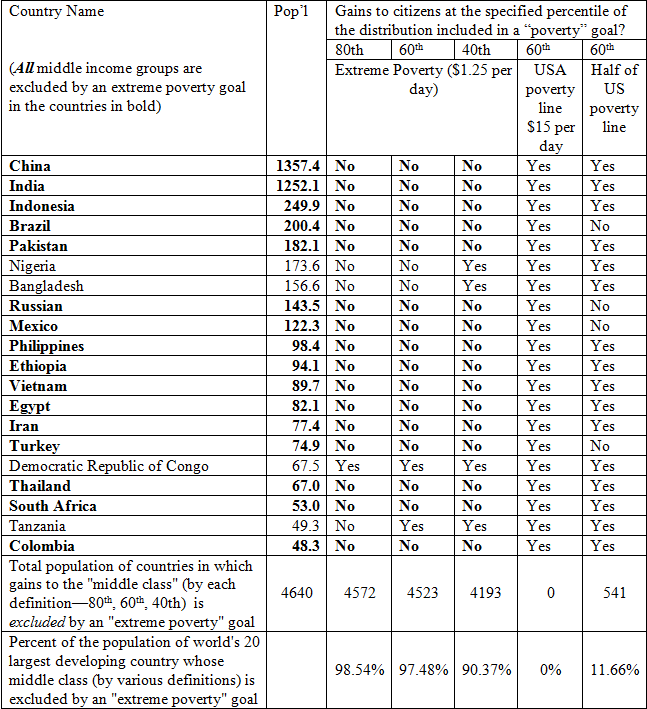This chart is from an interesting blog post by Lance Pritchett, an economist who regularly puts forward very interesting ideas. The United Nations proposed "Millennium Development Goals" in which nations agreed to try to reduce some aspects of poverty to achieve defined benchmarks by 2015. There is now an interest in defining some comparable agreement for the post 2015 period.
It has been suggested that the agreement should focus on the complete abolition of "extreme poverty" and that the benchmark should be that no one in the world should be trying to get by on less than the equivalent of $1.25 per day after 2030.
Of course, no one suggests that that is the only objective that any country should have. The thrust of Pritchett's argument and the chart is that most of the people in the world already have incomes above the poverty level, and that all the developing countries of course seek to improve the lives not only of their poor but also of the middle class.
As an aside, we all want to see the Ebola epidemic ended in west Africa. That epidemic currently is only a tiny blip on global morbidity and mortality rates; its eradication would not be expected to be a United Nations Development Goal of the sort we are discussing here. Still it is a goal for the world.
Even more to the point, many people believe that it is the middle class development that drives general social and economic development, and that the accomplishment of the elimination of extreme poverty is inextricably linked to the growth and improved wellbeing of the middle class.
The elimination of extreme poverty is a nice slogan, not a development plan. Yet it is something devoutly to be desired. Indeed, as I have suggested before and as Pritchett implies, we should not be satisfied until everyone has a much better standard of living than $1.25 per person per day implies, perhaps $15 per person per day, as is the standard in the USA.
There is much to be said for a panel of benchmarks, directing attention to the worst aspects of poverty. Increasing money income while leaving people unnecessarily hungry, uneducated, and/or sick is hardly desirable.
As to the World Bank, which as made the elimination of extreme poverty by 2030 the center of its policies, that is of course a matter for its member states and its Board of Directors to determine. I would note however, that in terms of the global production of goods and services (about $85 trillion in purchasing power parity, PPP) the World Bank funding is quite small. It might focus on a relatively small objective, recognizing that it should not limit the aims of the countries it seeks to help by development finance by imposing the Bank's own limited objectives on all.

No comments:
Post a Comment